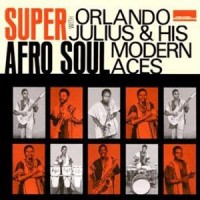
Nigeria has one of the richest musical histories of any country on the African continent. Considering the competition, that is really saying something. A country wracked with centuries’ worth of war, poverty, and countless other social ills, music has remained a constant unifying force, and it is the lifeblood of its peoples. For Nigerians, music is not a huge part of life—it is life. In fact, it is said that every Nigerian boy is given a drum before he learns to walk.
The evolution of Nigerian music can be traced back thousands of years, but it was its more modern forms that made the country a major player on the world music stage in the second half of the 20th century. It didn’t hurt that by this point the country already had a rich base shaped by a cross-cultural pollination dating back to the early days of colonization. Much of this occurred in the Nigerian capitol and busy port city of Lagos, where the heavily-rhythmic yoruba form dominated. Beginning in the 1900s, a plethora of musical influences, among them ragtime, calypso, meringue, blues, and even some Celtic forms, would join the mix, over time giving birth to a sound that was truly pan-global in every sense of the term.
But perhaps the most significant event in the evolution of modern Nigerian music was the arrival of highlife from neighboring Ghana in the early ’50s. A form with a resemblance to Trinidadian calypso and the American big band sound of the ’30s and ’40s, highlife would evolve and truly come into its own in Nigeria. Heavy on the brass, Nigerian highlife bands slowly began to emphasize the electric guitar, an instrument with widespread availability all over the world by the early ’60s. Vibrant, rhythmic, and extremely danceable, highlife became a major touchstone of Nigeria’s modern cultural identity, which in itself had taken on a whole new meaning following the gaining of the country’s independence from Great Britain in 1960.
Highlife continued to evolve throughout that decade, occasionally even leaving the confines of its national borders to enjoy some niche popularity in some western countries. One of its prime exporters was a young multi-instrumentalist by the name of Fela Anikulapo Ransome Kuti. In the early ’60s, Fela’s gifted musicianship landed him a spot at the prestigious Trinity College of Music in London, a city that at that time was experiencing the rumblings of a musical revolution of its own. Fela returned to Nigeria in the mid-60s and formed the band Koola Lobitos. His growing demand as an international performer would eventually bring him to Los Angeles in 1969. There he would become heavily steeped in the Black Power movement and also become exposed to the work of the soul music giants of the era, most significantly James Brown. When Fela returned to Nigeria at the end of the decade, he did so with his own musical and political agendas. Nigerian music would never be the same.
As monumental as Fela’s impact was, its downside was that it overshadowed the work of his Nigerian musical peers. While some were certainly influenced by Fela, many were innovators in their own rights. Fela might have coined the term “afrobeat” for his own music, but the term has since become synonymous with the immensely rich and diverse sounds that emanated from Nigeria in the 1970s and beyond. It has influenced artists from the Talking Heads to Vampire Weekend, and it can be heard today in the samples and beats of hip-hop and electronica and on the floors of dance clubs the world over. But as pervasive and ubiquitous as it has become, Afrobeat stands alone. It is the sound of modern Africa, but one where also can be heard the heartbeat of a culture whose history can be traced back to the birth of human civilization. Like a visit to Nigeria itself, fully exploring its music is a challenging, but rewarding, endeavor. Here are some places to begin the expedition.
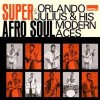 Orlando Julius & His Modern Aces Super Afro Soul (2000) While Fela would become Nigeria’s most recognizable musical icon, Orlando Julius was the country’s first true pop superstar. A major purveyor of hIghlife in the mid-60s, Julius diverted from the rest of the pack by incorporating Stax and Motown influences into his sound, creating an infectious hybrid of highlife and soul. Though revered by many musicians outside of his homeland, Julius never found the massive international audience that he deserved. Fortunately, British label Strut Records sought to remedy this by reissuing this album, which highlights this fertile period of his career.
Orlando Julius & His Modern Aces Super Afro Soul (2000) While Fela would become Nigeria’s most recognizable musical icon, Orlando Julius was the country’s first true pop superstar. A major purveyor of hIghlife in the mid-60s, Julius diverted from the rest of the pack by incorporating Stax and Motown influences into his sound, creating an infectious hybrid of highlife and soul. Though revered by many musicians outside of his homeland, Julius never found the massive international audience that he deserved. Fortunately, British label Strut Records sought to remedy this by reissuing this album, which highlights this fertile period of his career.
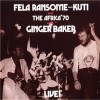 Fela Ransome Kuti & Ginger Baker Live! (1971) Cream drummer Ginger Baker was rock royalty’s earliest adopter of Nigerian music. Building a state of the art recording studio in Lagos in the early 70s, he is widely credited for introducing the music of Nigeria to western audiences. Baker and Fela met in London in the late 60s, resulting in a lifelong personal and musical friendship that would benefit both of them. This recording, made in a London club in 1970, showcases the two icons joining forces to deliver a killer set. Baker’s drumming not surprisingly sometimes gives it a more rock-like feel, making this a unique entry in Fela’s catalog.
Fela Ransome Kuti & Ginger Baker Live! (1971) Cream drummer Ginger Baker was rock royalty’s earliest adopter of Nigerian music. Building a state of the art recording studio in Lagos in the early 70s, he is widely credited for introducing the music of Nigeria to western audiences. Baker and Fela met in London in the late 60s, resulting in a lifelong personal and musical friendship that would benefit both of them. This recording, made in a London club in 1970, showcases the two icons joining forces to deliver a killer set. Baker’s drumming not surprisingly sometimes gives it a more rock-like feel, making this a unique entry in Fela’s catalog.
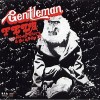 Fela Anikulapo Kuti & Africa 70 Gentleman (1973) When confronted with the bewildering size of Fela’s catalog, many people often ask the same question: “Where should I start?”. Really, pretty much any of his studio albums released between 1971 and 1978 will make anyone a fan for life. But this album is where the template for Fela and Africa 70’s incendiary brand of afrobeat was truly established. Its title track, with Fela’s blistering sax (an instrument that he allegedly learned and mastered in just a few days following the departure of Africa 70 tenor saxophonist, Igo Chico), is worth the price of admission alone.
Fela Anikulapo Kuti & Africa 70 Gentleman (1973) When confronted with the bewildering size of Fela’s catalog, many people often ask the same question: “Where should I start?”. Really, pretty much any of his studio albums released between 1971 and 1978 will make anyone a fan for life. But this album is where the template for Fela and Africa 70’s incendiary brand of afrobeat was truly established. Its title track, with Fela’s blistering sax (an instrument that he allegedly learned and mastered in just a few days following the departure of Africa 70 tenor saxophonist, Igo Chico), is worth the price of admission alone.
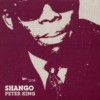 Peter King Shango (1974) A classically trained composer and saxophonist, Peter King is yet another criminally overlooked master of afrobeat. In the 70s, he recorded a handful of records containing a winning mix of jazz, funk, soul, blues, salsa, and, of course, rhythms from his own homeland of Nigeria. This can be heard in all its hip-shaking glory on this record, which unfortunately to date remains his only one to be reissued.
Peter King Shango (1974) A classically trained composer and saxophonist, Peter King is yet another criminally overlooked master of afrobeat. In the 70s, he recorded a handful of records containing a winning mix of jazz, funk, soul, blues, salsa, and, of course, rhythms from his own homeland of Nigeria. This can be heard in all its hip-shaking glory on this record, which unfortunately to date remains his only one to be reissued.
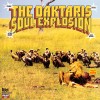 The Daktaris Soul Explosion (1998) You would never know it, but this album was actually recorded in the late-90s by a bunch of guys from Brooklyn, many who would go on to form Antibalas Afrobeat Orchestra soon after its release. So convincing was its vintage sound and packaging, however, that many collectors were sure that they had stumbled upon a long lost afrobeat classic. (One of the evil geniuses behind this ruse was Gabriel Roth, eventual founder and boss of Daptone Records.) Despite the gimmickry, it’s the music that has to deliver in the end, and it does so in spades. Dedicated to Fela, the album kick-started the afrobeat revival. thereby keeping his torch ablaze while proudly carrying it into the 21st century.
The Daktaris Soul Explosion (1998) You would never know it, but this album was actually recorded in the late-90s by a bunch of guys from Brooklyn, many who would go on to form Antibalas Afrobeat Orchestra soon after its release. So convincing was its vintage sound and packaging, however, that many collectors were sure that they had stumbled upon a long lost afrobeat classic. (One of the evil geniuses behind this ruse was Gabriel Roth, eventual founder and boss of Daptone Records.) Despite the gimmickry, it’s the music that has to deliver in the end, and it does so in spades. Dedicated to Fela, the album kick-started the afrobeat revival. thereby keeping his torch ablaze while proudly carrying it into the 21st century.
Further listening: With growing interest among DJs, crate-diggers, and world music aficionados, the aughts saw an explosion of Nigerian music compilations. Strut records has done for afrobeat what Trojan Records did for reggae. Its 2000 release, Nigeria 70, provides an outstanding primer to afrobeat and its related forms. (Original pressings contained a standalone disc containing an excellent aural documentary of Nigeria’s musical history, which was unfortunately omitted from the recent reissue.) If you’re looking for highlife, seek out the Vampi Soul label’s Highlife Time, a collection with some of the best examples of the genre. Finally, the Soundway label’s in-progress “Special” series probably digs the deepest into Nigerian music of the ’60s and ’70s of any releases thus far; Nigeria Rock Special, which highlights the more psychedelia-influenced sounds of the period, is a great place to start. The music of modern Nigeria still remains a relatively untapped resource. What’s available now is only the beginning! —Richard P



who is the author???
A local writer, Richard Potsubay.